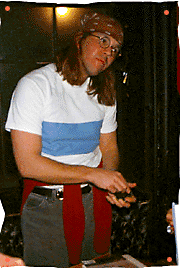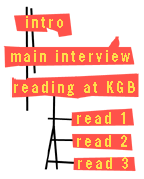


 |
||

|

|
|
|
by Valerie Stivers David Foster Wallace did not expect to be the Spring '96 literary posterboy. After all, Infinite Jest is only his second novel and it spends its 1000-plus pages satirizing and decrying consumer and media culture. But the media has made him their darling nonetheless, and book-buyers are, well, buying it. And now, this self-effacing young author—and his bludgeon-sized book—have found themselves riding a self-perpetuating hype wave.His publisher's intense publicity campaign began last summer and apparently it paid off: the novel was already in its fourth printing when it arrived in bookstores this February. Reviews and profiles have appeared everywhere from the New York Times to Salon, from the Atlantic Monthly to Puncture. Fittingly, the hype merited media coverage of its own. A book mocking products, it seems, can still be a hot one. But my fear, as a reader of Infinite Jest, was that the joke was on me. |
|
|
|
The Quebecois, however, want out. In Infinite Jest, the French Canadian residents of what is in our world the Canadian province of Quebec, wage a terrorist campaign against the rest of the Onanites, whom they view as selfish, immediate-gratification seekers. Their secret weapon is Incandenza's seminal film "Infinite Jest", which, as it turns out, is a fatal kind of fun. The film is said to be so compelling, so mind-numbingly satisfying, that its viewers slip into near-comatose states. For the fun-obsessed Onanite entertainment consumer, "Infinite Jest" is an irresistible commodity. But as I said, all this fun fatale made me paranoid. After all, I was actively enchanted, slack-jawed, and entertained by Infinite Jest—thankfully the book, not the film—so where did that leave me? It was a funhouse mirror and I had to look. It was with no small amount of trepidation, then, that I approached the Sheraton Manhattan where Wallace was staying during the New York leg of his nine-city book tour. More cause for nervousness was the fact that Wallace, a 34 year-old writer who teaches creative writing at Illinois State University in Bloomington, Ill., was never smiling in his publicity shots. Also, he wore an unsettling bandanna for every photo, forcing me to wonder, what's underneath the bandanna? Why does he need the bandanna? What's wrong with the top of your head, brother? |
|
|
|
Like his book, and like Don Gately, one of the novel's recovering drug addicts, Wallace is big and sort of square (in shape, not in attitude). While we talked about fiction as a medium of media critique and what exactly about our media-saturated culture Wallace objects to, the author of this wickedly funny, brilliant book fidgeted in his chair like a child, smoked, and inserted ungainly wads of tobacco between cheek and gum. "I know I'm really disgusting," he disclaimed. "I'm just nervous." Talking to Wallace is like edging a large reluctant boulder onto a slope—hard to get started and difficult to stop. I got dizzy just watching him. But, despite my expectations, he was very nice. And my fear that the book was personally mocking and threatening me, the faithful reader, was, well, paranoid and off-base. Wallace does not consider his book the same kind of media entertainment that he is critiquing. It should have been obvious. Not mistaken, however, was my conviction that Wallace, with his yarn of drug addicts and devotees, was engaged in a denouement of the human condition in a media-saturated, entertainment-mediated world. Infinite Jest is a futuristic burlesque of entertainment, a novel concerned about what we choose to get ourselves off on, and where we find ourselves when we turn away from the television or the drug wears off. |
|
|